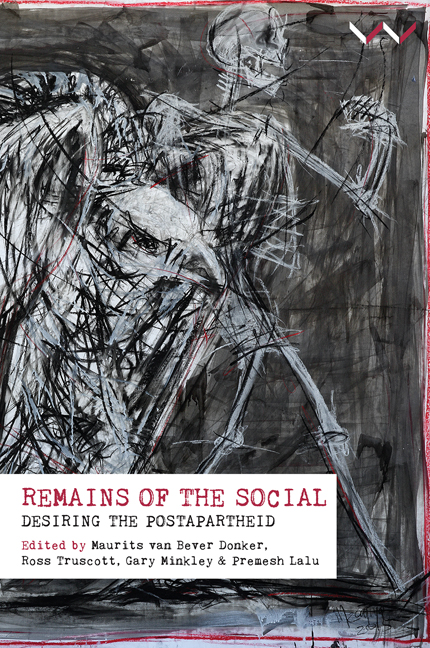Book contents
- Frontmatter
- Contents
- Acknowledgements
- Preface
- Chapter 1 Traversing the Social
- Chapter 2 The Mandela Imaginary: Reflections on Post-Reconciliation Libidinal Economy
- Chapter 3 The Return of Empathy: Postapartheid Fellow Feeling
- Chapter 4 The Ethics of Precarity: Judith Butler's Reluctant Universalism
- Chapter 5 Hannah Arendt's Work of Mourning: The Politics of Loss, ‘the Rise of the Social’ and the Ends of Apartheid
- Chapter 6 Souvenir
- Chapter 7 Re-Cover: Afrikaans Rock, Apartheid's Children and the Work of the Cover
- Chapter 8 The Graves of Dimbaza: Temporal Remains
- Chapter 9 The Principle of Insufficiency: Ethics and Community at the Edge of the Social
- Chapter 10 The Trojan Horse and the ‘Becoming Technical of the Human’
- About the Contributors
- List of Figures
- Index
Chapter 9 - The Principle of Insufficiency: Ethics and Community at the Edge of the Social
Published online by Cambridge University Press: 21 April 2018
- Frontmatter
- Contents
- Acknowledgements
- Preface
- Chapter 1 Traversing the Social
- Chapter 2 The Mandela Imaginary: Reflections on Post-Reconciliation Libidinal Economy
- Chapter 3 The Return of Empathy: Postapartheid Fellow Feeling
- Chapter 4 The Ethics of Precarity: Judith Butler's Reluctant Universalism
- Chapter 5 Hannah Arendt's Work of Mourning: The Politics of Loss, ‘the Rise of the Social’ and the Ends of Apartheid
- Chapter 6 Souvenir
- Chapter 7 Re-Cover: Afrikaans Rock, Apartheid's Children and the Work of the Cover
- Chapter 8 The Graves of Dimbaza: Temporal Remains
- Chapter 9 The Principle of Insufficiency: Ethics and Community at the Edge of the Social
- Chapter 10 The Trojan Horse and the ‘Becoming Technical of the Human’
- About the Contributors
- List of Figures
- Index
Summary
Either ethics makes no sense at all, or this is what it means and has nothing else to say: not to be unworthy of what happens to us (Deleuze 149).
Community works. This is not to suggest that community should be taken as a given or, indeed, as that at which we must arrive, as that whose construction presents a redemptive hope for our present. Rather, it is at play, always, whether as a differential that produces racial formations (such as the invocation of ‘the community’ at the centre of apartheid legislation) or as a constitutive limit enabling the thinking of what might come after apartheid. In other words, it is already operative, in each instance perhaps, as a function of enclosure for identity or as an unstable edge that flirts with an expression of the new. This is to suggest that limits, markers of the edge of community, in turn function not only as boundaries or curtailments, but also as openings, unfolding on their motile edges towards the new: the opening of a terrain not enclosed within the particularity of the membrane that the limit implies and, I suggest, on which a postapartheid subjectivity might arrive. This subjectivity, this possible subjectivity, is the living, mutating ground from which a ‘community of the touch’, to use a turn of phrase from Jean-Luc Nancy's ‘The Inoperative Community’, might emerge: this touch does not penetrate; it knows nothing of being enclosed in a common skin but rather plays on the surface, abiding in a proximity that touches, always. It is this question of the subject, a sense of subjectivity at its own edge as the constitutive limit for community, which this chapter explores.
It is, however, not simply an abstract question. The question of community and the social is threaded with the persistence of what can be understood as apartheid's remainders as these cut into the potentialities of life in our present. Indeed, it seems that an urgent demand of the present moment in South Africa is for life to be practised, or at least for such a practice to be learned, in the wake of apartheid. These remainders, the persistence of the limit qua limit and its enclosure of subjectivities within reified expressions of race, ask of us that we think the social in a more conceptual and yet rigorously lived sense.
- Type
- Chapter
- Information
- Remains of the SocialDesiring the Postapartheid, pp. 225 - 248Publisher: Wits University PressPrint publication year: 2017

